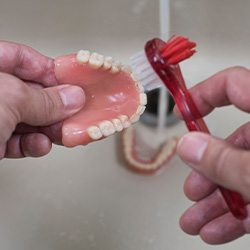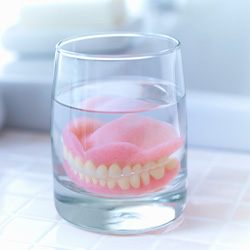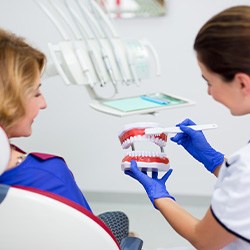Dentures – Lisle, IL
Complete Your Smile with Dentures
 We believe patients who have experienced advanced tooth loss deserve a smile restoration to reinstate their confidence and quality of life. We offer custom-crafted dentures in Lisle to deliver results that look and feel great. We only use durable, high-quality materials to ensure they last for years while providing optimal performance. Whether you need new dentures or an adjustment to an existing denture, we have the solutions for you. You’ll achieve the full, flawless smile you desire.
We believe patients who have experienced advanced tooth loss deserve a smile restoration to reinstate their confidence and quality of life. We offer custom-crafted dentures in Lisle to deliver results that look and feel great. We only use durable, high-quality materials to ensure they last for years while providing optimal performance. Whether you need new dentures or an adjustment to an existing denture, we have the solutions for you. You’ll achieve the full, flawless smile you desire.
Who's a Good Candidate for Dentures?

Are dentures right for you? This is a good question to ask whenever your smile is incomplete, regardless of how many teeth have been lost. Dentures can be more versatile than you realize and can be an excellent option in a number of situations. Nevertheless, it’s best to schedule a consultation with our dental team members so that we can confirm whether dentures are the right tooth replacement method in your case.
Effects of Missing Teeth

You could be missing teeth for a variety of reasons. Perhaps you are suffering from gum disease that wasn’t treated in time. Maybe the tooth itself was so badly decayed that it had to be taken out of your mouth. And in certain cases, the gap could be a consequence of an accident that resulted in you getting hit in the face.
Losing any number of teeth can lead to serious consequences. For example, without the stimulation provided by your natural teeth, your jawbone may start to degenerate over time. Other effects of missing teeth can include:
- Not being able to enjoy all of your favorite foods anymore due to difficulty chewing.
- Having a hard time being understood as a consequence of no longer being able to speak clearly.
- Feeling embarrassed about the way your smile looks, which can lead to reduced self-esteem.
What Qualifies You for Dentures?

Dentures can be used to replace multiple teeth at once and greatly improve your ability to eat, speak, and smile. You will likely want to consider getting dentures if you have lost multiple teeth or all of your teeth. Before you need to make any commitments, we’ll confirm that you’re a viable candidate for dentures by examining your mouth and making sure that you have healthy gums and the right amount of bone in your jaw.
Remember that qualifying for dentures can mean more than one thing. A full denture is ideal if an entire row of teeth is gone. However, if you only have a few gaps to fill, we are likely to suggest a partial denture instead. Additionally, depending on the state of your jawbone, you may be able to get dentures anchored to dental implants for additional stability and chewing power.
Alternative Tooth-Replacement Options

Have you discovered that dentures aren’t the best fit for you? Don’t worry. Our team has other ways to help you achieve a complete smile again.
- Dental Bridges: You may want to think about having a dental bridge placed if there’s only one gap in your smile that needs to be filled. By attaching the prosthesis to two of your natural teeth, we can literally “bridge” the empty space.
Dental Implants: Dental implants are the only type of tooth replacement that can act as new tooth roots, which means they can offer all kinds of unique benefits. To qualify for dental implants, you need to be in good enough health for minor oral surgery.
Types of Dentures
You have more options than ever to rebuild your smile. Depending on your severity of tooth loss, you might be a candidate for:
Partial Dentures

A partial denture fills the gaps between missing teeth. The prosthetics are made with a gum-colored base material that’s crafted to fit snuggly between your teeth. The base supports the replacement teeth. Metal bars connect to the healthy teeth to hold the partial in place, so you don’t have to worry about any slipping or irritation.
Full Dentures

As the name suggests, a full denture is used to replace an entire row of teeth. Like a partial, it has a gum-colored base to support the prosthetic teeth. The base is made of comfortable material to minimize any irritation as it rests on top of your gum tissue. It relies on suction or an adhesive to stay in place to speak, laugh, and eat freely without worrying about your denture falling out.
Implant Dentures

Implant dentures replicate both the roots and crowns of missing teeth. 4 to 10 titanium posts are surgically placed into your jawbone to support the denture. Dental implants provide unmatched support and stability for a nearly perfect recreation of your real smile. An implant denture can last for decades with the proper care for a long-term investment.
How Dentures Are Made

There’s no such thing as a one-size-fits-all denture. Each prosthesis needs to be carefully designed and crafted so that it matches the patient’s specific needs. Have you ever wondered about how dentures are made? Our team can go over the various steps involved with you in order to help you fully understand the process. If you keep reading below, you’ll find a brief summary of the materials used to make dentures as well as how they’re made.
What are Dentures Made Of?

Your denture will be made up of a base and a number of artificial teeth. Specific materials are used to make each of these components:
- The base of the denture will often be made out of acrylic. One of the biggest advantages of using acrylic is that it can be designed to match the appearance of your gums, thus giving your prosthesis a more natural appearance overall. Note that if you have partial dentures, the acrylic base will also include metal clips to hold your dentures in place.
- The artificial teeth of the dentures can potentially be made out of resin. That said, it’s more common for porcelain to be used thanks to how natural it looks and feels in the mouth.
The Denture Creation Process

After we have confirmed that you are a candidate for dentures and have narrowed down the type you should get, we can begin the multi-step process of having your dazzling new prosthesis made. This generally involves the following steps:
- Our team will make a model of your mouth after taking the appropriate impressions. This model is vital for creating a denture that is precisely the right shape and size for your smile. We’ll also take any measurements of your jaw that might be needed.
- The model of your mouth will be sent to a trusted dental laboratory. The experts at this lab will make a wax version of your gums. An appropriate number of artificial teeth will be placed in the wax with a device called an articulator.
- The wax dentures will be sent to our office so that we can confirm that they fit comfortably in your mouth. If we’re happy with the results, the wax dentures can be returned to the lab so that the process can continue.
- The next step is to get rid of the wax portion of the dentures. This is done by placing them in a flask that will be immersed in hot water. Plaster is used to help the dentures maintain their shape even after the wax has been removed.
- Acrylic will be injected into the flask so that it can act as a new base for the dentures. The plaster is carefully removed, and excess acrylic is taken off to put the finishing touches on the new prosthesis.
- The completed dentures are sent back to us. At this point, all that’s left is to bring you back to our office so that we can make sure that your new teeth fit as they should.
Adjusting to Your New Dentures

Once you get your final dentures, there may be some mild discomfort, and you’ll need time to get used to speaking and chewing with your new teeth. There are steps you can take to help the adjustment process go more smoothly, such as eating soft foods; our team will be happy to share any tips you might need.
The Benefits of Dentures

Tooth loss can impact the quality of your life in several ways. Not only is it harder to eat and speak with ease, but you might also feel self-conscious or overly anxious about how others will perceive you. Thankfully, our team can fit you with lifelike dentures to enhance your appearance while simultaneously restoring your ability to enjoy meals and conversations more like you used to. Continue reading below to learn more about some additional benefits of getting dentures. If you have questions or would like more information, please contact us and our friendly staff would be happy to help you.
Psychological Benefits

Whether you’ve lost several or all of your teeth, having an incomplete smile can negatively impact your self-esteem. It’s easy to feel like you’re not the same person you used to be, and you might avoid social interactions as a result. Plus, fear of judgment over your appearance can leave you tight-lipped or unwilling to smile to speak in front of others. Our dentists can fit you with beautiful, lifelike dentures to rebuild your grin to alleviate your worry. Having artificial teeth in place can give you some well-deserved peace of mind that allows you to feel comfortable engaging with other people again.
Clearer Enunciation

You need teeth to talk because you form certain sounds and words by pressing your tongue against them in specific ways. When they go missing, you could develop a lisp or have other challenges when it comes to communication. Unfortunately, when you struggle to enunciate things then you’re more likely to be misunderstood by others. Dentures contain the right number of pontics (artificial teeth) to help you speak clearly. While it can take about a month for the muscles in your mouth to adjust to them, once you do, it’ll become second nature.
Improves Nutrition

Did you know that when teeth are lost you’re more likely to develop other medical concerns like gastrointestinal issues? This is because they are responsible for mashing your food into pieces small enough to be easily swallowed and digested. You’re less able to chew effectively without a full mouth of teeth, and the larger bits of food can cause problems in your stomach. Furthermore, you might not get all the nutrients you need to keep your body in good condition if you opt for easy-to-consume alternatives. Once your dentures arrive, you’ll be able to partake in a wider variety of wholesome foods to support full-body health.
Preserves Oral Health

When your teeth fall out and leave spaces behind, any remaining pearly whites will naturally shift to try to fill in the gaps. As they shift out of alignment, they’ll be exposed to uneven wear and tear which makes them more prone to breaking. They will inevitably take on added pressure every time you bite down to chew which can eventually chip or fracture them. Dentures, meanwhile, can take on the force of eating and ensure that teeth remain in their initial positions.
Expands Opportunities

Your smile is one of the first things other people notice about you and if yours has holes, you might not be as successful. You could find yourself avoiding opportunities that could pay off, like scheduling an interview for a higher-paying position or making an important presentation to colleagues. It’s unfortunate, but studies have found that the probability of being employed is negatively associated with poor oral health. Dentures are a great way to refurbish your grin so that you can get ahead in life after tooth loss.
Understanding the Cost of Dentures

Perhaps you’re hesitant about getting dentures. In particular, maybe you fear they’re too expensive. That’s a fair concern – a treatment outside your budget won’t help your smile. Still, the cost of dentures actually varies by patient. You can only get an exact estimate by consulting our dentists. Whatever the final tally, though, Arbor Dental Care will work to make your care affordable. Our team will even walk you through denture cost factors and available payment options.
Factors That Affect the Cost of Dentures

At the initial consultation, Drs. Frank and Jeanelle Marchese will perform an oral exam. Doing so lets them assess factors related to your dentures’ price. The most common of these are:
- Whether you need prep work before getting dentures (i.e., root canal, tooth extraction, etc.)
- The acrylic material used for the denture base – the part of the appliance dyed to match your gum tissue
- The replacement teeth, whose material is usually porcelain or acrylic (These chompers need to be sturdy and lifelike.)
As the dentists review these factors with you, remember that the cheapest dentures aren’t ideal. Such kinds rely on subpar acrylic for their bases and teeth. For longer-lasting results, you ought to choose practical and high-quality prosthetics!
Are Implant Dentures More Expensive?

Regarding the upfront cost, implant dentures are the more expensive choice. That said, their higher price is entirely justified.
For starters, implant dentures have features traditional ones don’t. They contrast from the standard due to using dental implants – restorations that fuse with your jaw. As such, these prosthetics are permanent and highly secure; they won’t slip or fall. Their fusion also ensures they look and act like natural teeth.
Furthermore, implant dentures usually pay off in the long run. Their implants can last 15-30 years, requiring fewer repair and replacement fees. Meanwhile, regular dentures have a lifespan of 5-7 years and need many (and pricey) follow-up visits.
Does Dental Insurance Cover Dentures?

Yes, actually – dental insurance usually does cover dentures. The latter procedure is considered major, so most companies will cover 50% of its cost.
All that said, you can always find exceptions. Your own insurance plan may limit its denture coverage. That being the case, confirm your benefits before pursuing treatment. Our team can even help you do so if necessary.
Other Options for Making Dentures Affordable

Of course, insurance isn’t the only way to make dentures affordable. Other options also exist! Especially notable are the dental practice’s payment options. If you find the right one, dentures don’t have to break your budget.
Look at our own Arbor Dental Care, for example. We happen to work with CareCredit – a reputable third-party financier. Through them, you can pay for dentures in low-interest monthly installments. This approach lets you cover the treatment cost gradually instead of all at once.
Ultimately, we’d be more than happy to give you beautiful and affordable dentures. With that said, book a consultation at our office to learn more!
Dentures Aftercare

If you wear dentures, proper care is essential to keep them comfortable, functional, and looking their best. Whether you have full or partial prosthetics, following a consistent cleaning routine helps prevent stains, odors, irritation, and infections. At Arbor Dental Care, we want to ensure your dentures stay in excellent shape for as long as you have them.
That’s why we’ve put together an educational resource full of useful information from daily cleaning tips to signs of wear and tear you should know. Denture aftercare can make a big difference in the longevity and comfort of your prosthetics, so read more below to arm yourself with knowledge.
Remove After Eating

After every meal, it’s best to remove your dentures and rinse them thoroughly with warm water. This helps eliminate food particles and reduces the risk of plaque buildup. Just avoid using hot water, as it can warp the base material and throw off the fit of your prosthetics.
A quick rinse keeps your dentures fresh between cleanings and prevents lingering odors. At our Lisle dental office, we also recommend keeping a soft-bristled brush handy for quick touch-ups throughout the day.
Clean Your Restoration

Beyond quick rinses, a daily cleaning routine is a must to prevent stains and bacteria from accumulating on your prosthetics. Brush them gently with a non-abrasive denture cleaner or clear, scentless hand soap and a soft brush. Never use regular toothpaste, as it can scratch the surface and remove the protective glaze from your false teeth.
Be sure to also clean your gums, tongue, and any remaining teeth as well. If you’re unsure what to use, let us know. We can recommend the best cleaning products to keep your dentures in peak condition!
Keep Your Dentures Safe

Dentures are durable, but not indestructible. Always handle them with care to avoid cracks or damage. When cleaning, place a soft towel or a bowl of water underneath in case they slip. When you’re not using them, store them in a protective case out of reach for curious children and pets. Also, never place them in an area of extreme heat like the dashboard of your vehicle, or near the stove. This can permanently warp and damage your prosthetics.
Remove When You Sleep

Taking your dentures out at night gives your gums time to rest and lowers the risk of contracting bacterial respiratory issues like pneumonia. So, try slipping them into a glass of cleaning solution or cold water as soon as you're finished with oral care. This will keep your prosthetics pliant and germ-free for their lifetime, saving you money on replacements and oral care.
Notice Changes

If your dentures feel loose, or uncomfortable, or if they cause sore spots, don’t ignore it. Over time, changes in your gums and jawbone can affect how they fit, leading to irritation or difficulty chewing. Regular checkups with our expert team ensure that your prosthetics are adjusted as needed for maximum comfort. If anything feels off, contact us right away for an evaluation!
Complete Your Smile Today
You don’t need to hide an incomplete smile any longer. We can revamp your self-esteem with dentures. Contact our office today to schedule your consultation for a functional smile. We look forward to creating a customizable, realistic partial or denture to speak, smile, and chew confidently.
Denture FAQs
Can I sleep with my dentures in my mouth?
Initially, your denture dentist in Lisle will instruct you to wear them for 24 hours, but then you'll need to get in the habit of taking them out before bed. Although no one wants to be caught without their teeth, your oral health and the lifespan of your denture rely on nightly removal. Dentures restrict blood circulation, which can lead to sores, inflammation, and infections if your gum tissue isn't given a break. Not to mention, your mouth is the ideal breeding ground for harmful bacteria because it's dark and moist. Removing your teeth before calling it a night allows you to clean your mouth and dentures to combat bacteria. Not only will you prevent odors and infections, but you'll also protect your denture from damage to get the most from your investment. Don't forget to place them in an overnight soaking solution to kill any bacteria left behind by your toothbrush.
Do I use regular toothpaste to clean my dentures?
Although your dentures will mimic your real teeth, you can't clean them the same way. Abrasive dental products can scratch your dentures, tarnishing their appearance. Plaque and bacteria can get trapped in the crevasses, leading to unpleasant odors. Over time, bacteria can weaken your denture, so you'll need a replacement sooner. It is better to use a soft-bristled toothbrush and a mild soap or dishwashing liquid. You can also purchase cleaning products designed for denture wearers. Besides brushing, soak your dentures every night to kill any lingering bacteria and keep them moist while you get the rest you need.
Do upper dentures always cover the upper palate?
Dentures come in many styles, including those that don't cover the palate. If you're concerned about an upper denture changing the way food tastes, you may benefit from one with a horseshoe shape. Your dentist will examine your mouth and learn more about your preferences to recommend the perfect style of denture to complete your smile.
Can I eat steak with dentures?
It's entirely possible to eat steak with dentures, but your dentist will advise you to have it in moderation. Chewy meats will put more wear and tear on your dentures. Prolonged chewing can also lead to sore gums and jaw pain. If you can't resist a juicy steak, cut it into small pieces to make it easier to chew. Don't forget to tenderize it before cooking your meat. You may also find an adhesive helpful for added stability, but don't use it as a long-term solution to stop your dentures from slipping.


